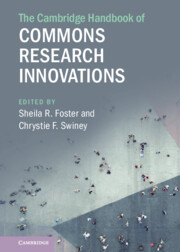Book contents
- The Cambridge Handbook of Commons Research Innovations
- The Cambridge Handbook of Commons Research Innovations
- Copyright page
- Contents
- Figures
- Tables
- Contributors
- Introduction
- Part I Revisiting the Origins and Evolution of Commons Thought
- Part II Averting New Tragedies
- Part III New Forms of Contested Commons
- Part IV Urban Landscape and Infrastructure as a Commons
- Part V Reassessing Old and New Institutions for Collective Action
- Part VI Managing and Restoring the Commons
- Part VII Law, Legal Theory, and the Commons
- Part VIII Technology, the Internet, and the Future of Commons Governance
- 25 Can Technological Change Weaken the Robustness of Common-Property Regimes?
- 26 Internet Governance in the Digital Cold War
- Index
25 - Can Technological Change Weaken the Robustness of Common-Property Regimes?
from Part VIII - Technology, the Internet, and the Future of Commons Governance
Published online by Cambridge University Press: 29 October 2021
- The Cambridge Handbook of Commons Research Innovations
- The Cambridge Handbook of Commons Research Innovations
- Copyright page
- Contents
- Figures
- Tables
- Contributors
- Introduction
- Part I Revisiting the Origins and Evolution of Commons Thought
- Part II Averting New Tragedies
- Part III New Forms of Contested Commons
- Part IV Urban Landscape and Infrastructure as a Commons
- Part V Reassessing Old and New Institutions for Collective Action
- Part VI Managing and Restoring the Commons
- Part VII Law, Legal Theory, and the Commons
- Part VIII Technology, the Internet, and the Future of Commons Governance
- 25 Can Technological Change Weaken the Robustness of Common-Property Regimes?
- 26 Internet Governance in the Digital Cold War
- Index
Summary
We examine the effect of technological change on the incentives to cooperate in the provision of common-pool resources (CPRs).We focus our analysis on CPRs that require investments in improvement and maintenance, such as irrigation systems.We find that major technological improvements, such as replacing a primitive irrigation system with a modern system, risk compromising cooperation as the temptation to freeride on other farmers’ investments is increased.By contrast, minor technological improvements within an existing irrigation system, such as strengthening water diversion devices, do not hinder incentives to cooperate.In our analysis, an irrigation system can be well-managed for a long period of time during technological progress when changes are minor.When technology changes are major, cooperation can be maintained if the community is patient and initially their discount factor is well above the critical level for cooperation.However, when the threshold is reached, any further major technological improvement will lead to a breakdown of cooperation and collapse of investments in the irrigation system.
Keywords
- Type
- Chapter
- Information
- The Cambridge Handbook of Commons Research Innovations , pp. 295 - 308Publisher: Cambridge University PressPrint publication year: 2021



